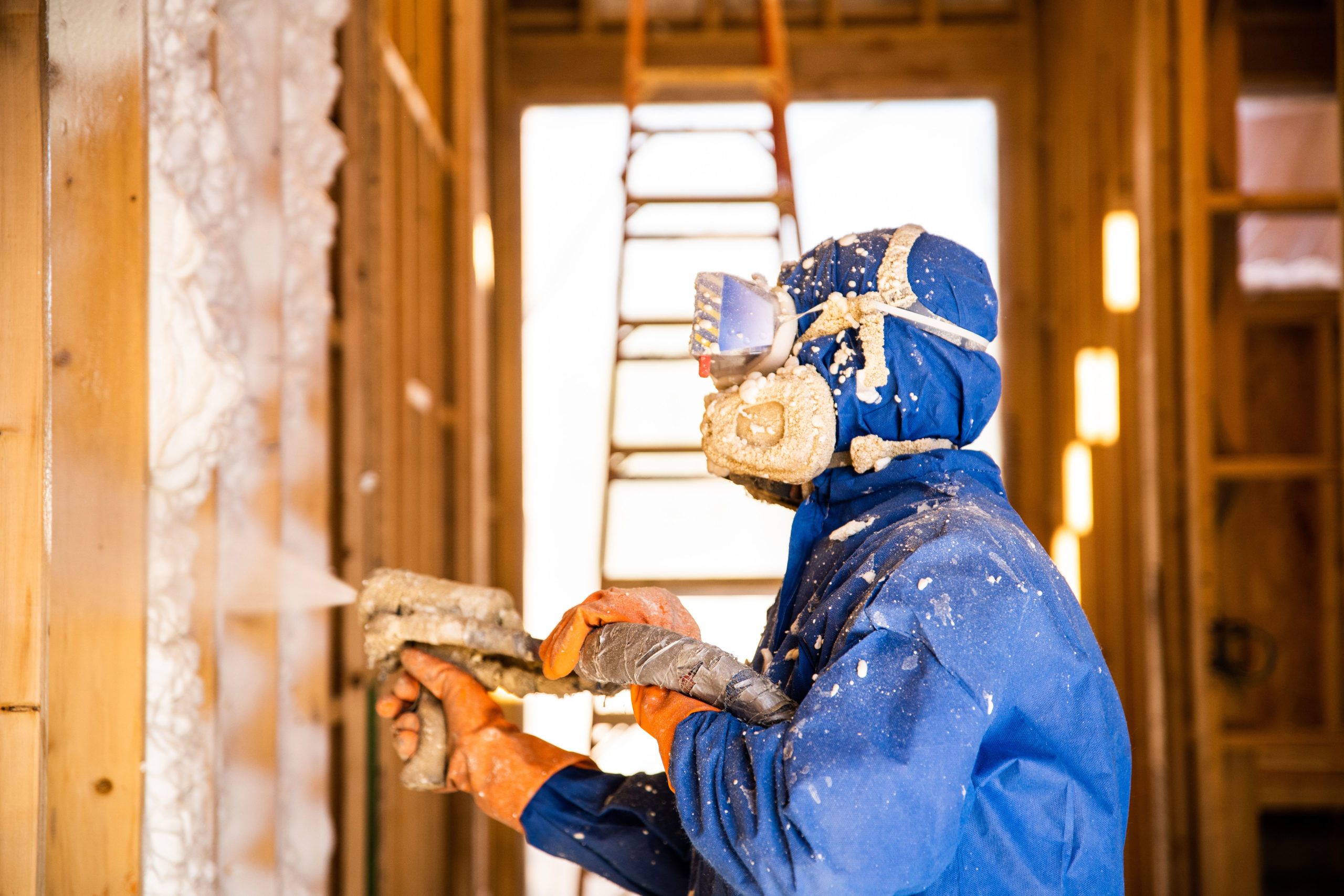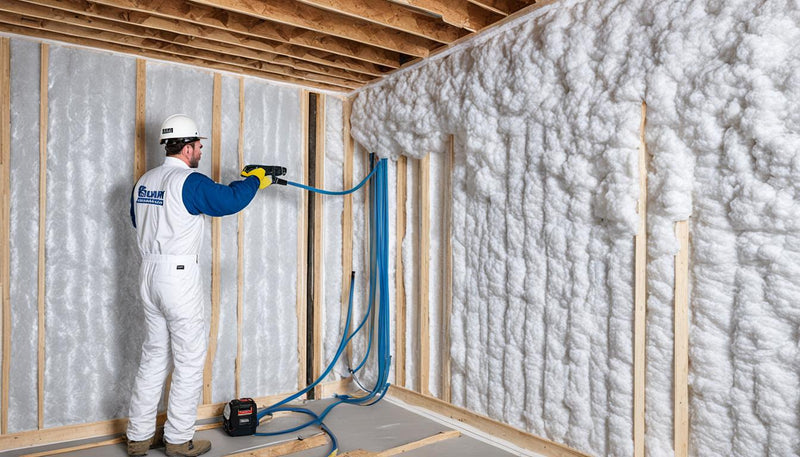How Spray Foam Can Boost Power Performance in your house
How Spray Foam Can Boost Power Performance in your house
Blog Article
Spray Foam: The Ultimate Solution for Air Sealing and Insulation
Spray foam insulation has actually arised as a leading remedy for effective air securing and thermal insulation, providing an unique combination of residential or commercial properties that establish it besides typical approaches. Its capacity to broaden and fill up gaps makes it especially effective in avoiding air leakage, which can significantly impact energy effectiveness. Recognizing the complete scope of its advantages, installment processes, and comparisons with other insulation types is critical for making educated decisions. As we discover these elements, the effects for both brand-new buildings and retrofits become significantly substantial. What aspects should influence your option?
What Is Spray Foam?
Spray foam is a versatile insulation product that combines the principles of air securing and thermal resistance to improve power effectiveness in structures. Made up mainly of polyurethane or various other similar substances, spray foam is applied as a liquid that broadens upon call with surfaces, developing a solid, constant layer of insulation. This one-of-a-kind building allows it to fill up spaces, cracks, and spaces that typical insulation materials may neglect, supplying an exceptional air seal.
There are 2 major sorts of spray foam: open-cell and closed-cell. Open-cell spray foam is lighter and more versatile, using superb audio absorption and a lower R-value per inch - Spray Foam. On the other hand, closed-cell spray foam is denser, giving a higher R-value, moisture resistance, and added architectural integrity to building components
The application process usually includes customized tools, ensuring a seamless application that complies with different substratums, including metal, wood, and concrete. This flexibility makes spray foam suitable for both brand-new building and constructions and retrofitting existing frameworks. Its capability to produce an impermeable barrier substantially adds to lowering power usage and enhancing interior air quality, thus making it a preferred choice amongst homeowners and builders alike.
Advantages of Spray Foam Insulation
One of one of the most significant benefits of spray foam insulation is its exceptional capacity to create a continual air barrier, which successfully lessens energy loss. Unlike traditional insulation products, spray foam expands to load cracks and spaces, guaranteeing that air leak is dramatically decreased. This particular not just enhances power efficiency however also causes decrease utility costs over time.
Additionally, spray foam insulation gives exceptional thermal resistance, contributing to a much more secure indoor setting. Its high R-value per inch enables for reliable insulation in restricted rooms, making it suitable for attics, walls, and crawl areas. The moisture-resistant residential properties of spray foam aid prevent mold and mold growth, promoting much healthier living conditions.
An additional critical benefit of spray foam insulation is its sound-dampening top qualities (Spray Foam). It effectively reduces sound transmission in between spaces, developing a quieter and more comfortable home environment. The sturdiness of spray foam likewise attracts attention, as it does not sag or clear up gradually, maintaining its efficiency throughout its life-span
Just How Spray Foam Functions
Comprehending just how spray foam insulation functions is crucial for valuing its efficiency in air securing and thermal resistance. Spray foam insulation includes two primary parts: isocyanate and polyol material. When these parts are mixed, they go through a chain reaction that triggers the material to expand quickly, producing a thick foam that fills cracks, voids, and tooth cavities.
As the foam broadens, it follows surface areas, forming an airtight seal that dramatically decreases air infiltration. This particular makes spray foam insulation extremely effective at preventing drafts and wetness infiltration, which can lead to energy loss and damage with time. Additionally, the closed-cell variant of spray foam provides remarkable thermal resistance due to its stiff structure, effectively lessening heat transfer.
The special properties of spray foam permit it to adapt irregular surfaces, making certain thorough insurance coverage and a seamless obstacle. Therefore, spray foam insulation not only boosts power efficiency but also adds to boosted indoor air quality by lowering the build-up of irritants and pollutants. Eventually, recognizing the technicians behind spray foam highlights its duty as a remarkable selection for insulation and air sealing in both industrial and residential applications.
Installation Process Review

Before installment, the area needs to be properly cleaned up and prepped, guaranteeing that surface areas are free from dirt, wetness, and debris. Since pollutants can compromise bond and overall efficiency, this action is important. As soon as the area is prepared, the application involves mixing the two elements of the spray foam, which increases upon call and fills up gaps properly.
Educated experts need to perform the installation, using specific equipment to make certain consistent insurance coverage and optimum density. Safety and security preventative measures, including using protective gear and making certain correct ventilation, are imperative throughout this process. After application, the foam commonly cures swiftly, creating a solid obstacle that enhances power performance.
Comparing Spray Foam to Traditional Insulation
When reviewing insulation choices, spray foam insulation stands out in comparison to standard products such as fiberglass and cellulose. Unlike fiberglass and cellulose, which can enable air seepage, spray foam broadens upon application, filling up gaps and gaps to produce an impermeable seal.
Furthermore, spray foam supplies a higher R-value per inch than typical insulation kinds, supplying more effective thermal resistance in a thinner account. This characteristic is especially advantageous in article rooms with minimal tooth cavity depth. Additionally, spray foam is resistant to wetness and mold and mildew development, which can be a significant interest in cellulose and fiberglass, specifically in humid atmospheres.
However, spray foam insulation typically lugs a greater upfront expense than its typical equivalents. Home owners have to weigh this preliminary investment against lasting power financial savings and performance advantages. Ultimately, while both insulation kinds serve their objective, spray foam emerges as an extra advanced solution for modern-day insulation demands, particularly in Visit Website regards to air securing and thermal efficiency.

Verdict
In summary, spray foam insulation stands for a highly efficient service for attaining optimal air sealing and thermal resistance. Its one-of-a-kind residential or commercial properties, including dampness resistance and noise dampening, make it ideal for numerous applications in both new building and constructions and retrofitting projects (Spray Foam). The preliminary expenses might be higher contrasted to standard insulation materials, the long-term benefits, such as significant power savings and boosted indoor air high quality, warrant the financial investment and underscore its worth in modern-day building techniques.
Spray foam insulation has emerged as a leading service for effective air sealing and thermal insulation, using an one-of-a-kind mix of residential or commercial properties that establish it apart from conventional methods.Spray foam is a versatile insulation product that combines the principles of air securing and thermal resistance to improve power performance in structures.When evaluating insulation alternatives, spray foam insulation stands out in comparison to standard materials right here such as fiberglass and cellulose. Inevitably, while both insulation kinds offer their function, spray foam emerges as a much more innovative service for modern-day insulation needs, particularly in terms of air sealing and thermal effectiveness.
In summary, spray foam insulation represents an extremely reliable remedy for achieving optimal air sealing and thermal resistance.
Report this page